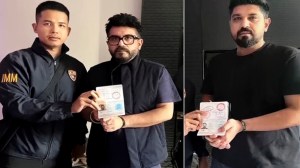People caught in web of courts for decades…now steps taken to rid people out of this: PM Modi
Says it is our collective responsibility to make justice as simple as possible.
 Giving the example of ‘E-Courts’ project, the PM highlighted the important role of technology in revolutionising India’s judicial system. (File Photo)
Giving the example of ‘E-Courts’ project, the PM highlighted the important role of technology in revolutionising India’s judicial system. (File Photo)Prime Minister Narendra Modi Sunday said that for decades, people were caught in the web of courts from which, once caught, they didn’t know when they would get out. Addressing the concluding ceremony of the platinum jubilee celebrations of the Rajasthan High Court in Jodhpur, the PM said that the nation has now taken effective steps to rid people of this cycle.
“If we think from a common man’s perspective, then for decades (people had to do) court ke aagey chakkar (rounds of the court) – the word chakkar had become mandatory. Rounds of the court, rounds for the case, yani ek aesa chakkar jismein fans gaye toh kab niklenge kuch pata nahi (that means such a circle where once you’re caught, you don’t know when you will get out),” the PM said.
He said that justice is simple yet, at times, the procedures make it complex. “It is our collective responsibility to take measures to make justice as simple as possible,” the PM said and expressed happiness that India had taken multiple historic and crucial efforts in that direction, including repealing many irrelevant colonial laws.
He said that after decades of Independence, the nation, “emerging out of the colonial mindset”, had adopted the Bharatiya Nyaya Sanhita (BNS), replacing the Indian Penal Code (IPC). He said that the BNS was based on the ideals of ‘justice in place of punishment’ which, he said, is also the basis of Indian thought.
He expressed confidence that the BNS “will advance human thought and free us from the colonial mindset…It is now our responsibility to make the spirit of Bharatiya Nyaya Sanhita as effective as possible.”
Giving the example of ‘E-Courts’ project, the PM highlighted the important role of technology in revolutionising India’s judicial system.
More than 18,000 courts in the country have been computerised so far and information pertaining to more than 26 crore court matters has been made available on a centralised online platform through the National Judicial Data Grid. More than 3,000 court complexes and over 1,200 prisons have been connected with video conferencing facilities, the PM said.
“National unity is the foundational stone of India’s judicial system and strengthening it will further strengthen the nation and its systems,” he added.
On the occasion, the PM inaugurated the Rajasthan High Court Museum. Rajasthan Governor Haribhau Bagade, Rajasthan Chief Minister Bhajan Lal Sharma, Union Minister for Law and Justice (independent charge) Arjun Ram Meghwal, Supreme Court judge Justice Sanjeev Khanna, and Rajasthan High Court Chief Justice Manindra Mohan Shrivastava were present.







